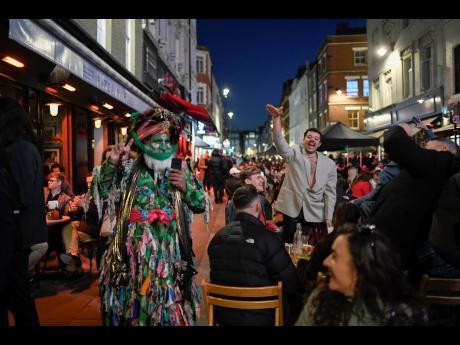UK hits vaccine target; Johnson warns of more virus deaths
LONDON (AP):
Britain began offering coronavirus vaccinations to anyone over 45 on Tuesday after hitting its target of giving at least one dose to everyone over 50 by the middle of April.
Despite the good news, Prime Minister Boris Johnson warned that the UK would inevitably see “more hospitalisation and deaths” as it emerges from lockdown. On Monday, non-essential shops, hairdressers, gyms, restaurant patios and beer gardens reopened in England.
Days before its self-imposed April 15 deadline, the government said everyone in its top priority groups – over 50s, healthcare workers and people with serious medical conditions – had been offered a jab, and about 95 per cent of them received one. More than 32 million people, over 60 per cent of the country’s adults, have had a first shot and almost 15 per cent of adults have got both doses.
Vaccine eligibility was expanded Tuesday to people ages 45-49, the start of the second phase of the inoculation campaign. The government aims to give everyone over 18 at least one dose by July 31.
The move came the day after some lockdown rules in place for more than three months were lifted in England. Relieved residents flocked to areas such as London’s Soho nightlife district, where tables were packed into narrow streets that had been closed to traffic.
Officials in Scotland, Wales and Northern Ireland are easing their restrictions at slightly different paces. Scottish First Minister Nicola Sturgeon announced that a “stay local” order would be lifted on Friday, when people will be able to travel within the country and meet others outdoors.
Politicians and scientists tried to temper the euphoria at the return of some freedoms with a warning that the virus still poses a major threat.
Britain has had Europe’s deadliest coronavirus outbreak, with more than 127,000 confirmed deaths. A combination of rapid vaccination and lockdown has sharply decreased its infection and mortality rates.
“Of course, the vaccination programme has helped, but the bulk of the work in reducing the disease has been done by the lockdown,” Johnson said.
“So as we unlock, the result will inevitably be that we will see more infection. Sadly, we will see more hospitalisation and deaths. People have just got to understand that,” he said.
Several of Britain’s neighbours, including France, have imposed new lockdown curbs as virus cases soar.
Chris Hopson, chief executive of health service organisation NHS Providers, agreed there were “good reasons to be cautious” about Britain’s pandemic trajectory.
“We need to be really careful about assuming we’re on a one-way, inexorable, inevitable track to it all being fantastic and we can go back to normal, because actually we’ll need a new normal,” Hopson said.
The pace of Britain’s vaccination drive has slowed in recent weeks, with the number of first doses falling sharply as the campaign focuses on delivering second shots.
Like many other countries, Britain is also receiving fewer doses than it had hoped for, partly as a result of India’s decision to stop exports of the Oxford-AstraZeneca COVID-19 vaccine from its Serum Institute.

